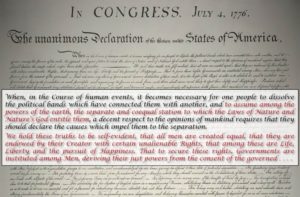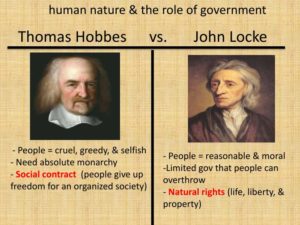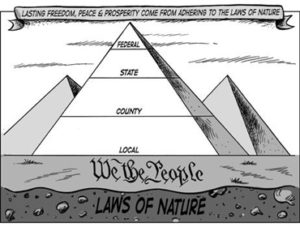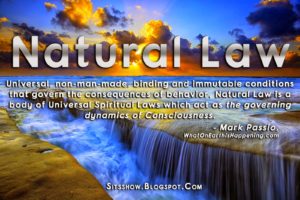
America’s Declaration Birthed by
John Locke’s Natural Law
Thomas Jefferson was heavily influenced by John Locke’s natural law philosophy when he penned America’s Declaration of Independence. This philosophy describes the divide between Conservatives, who believe in natural law, and the Liberals who appear to follow Thomas Hobbes philosophy of legal rights conferred by one’s reigning governmental system. Evangelical Christians have frequently joined the Conservatives because of some supposed belief that natural law is derived from God thus obligating them to adhere to the Conservatives. However, did John Locke draw his philosophy from the Bible? Is there bible verses that support natural law? Christians should care because we are morally obligated to follow Scripture and must be able to discern the truth of this matter to prevent us from inadvertently supporting Satan. This is the heart of this post.

Historically Locke and Hobbes are Opposites
Biblically they are the same: In Error
The term, natural law gets tossed about frequently but seldom has it been concisely defined as John Locke, and Thomas Jefferson, used and understood the term. Therefore, if we are to practice consistent hermeneutics we must use the term as defined by these men. In keeping with the Law of Identity, we must define natural law. John Locke asserts, “that men in the state of nature are free and equal, and at liberty to do as they wish—but only “within the bounds of the law of nature (Natural Law, Natural Rights and American Constitutionalism. John Locke and the Natural Law Tradition).”” Locke made this declaration based on his assumption that natural laws were rationally perceived by the natural mind. This was a common theme of the Enlightenment which rejected the enforced religiosity of the Scholastic Medieval period. Thus, reasonable people could discern the truth of any matter from their own mind because all minds could understand these truths; logical fallacy of Circular Reasoning.
From this thin-air reasoning, Locke theorized that all people had natural rights based on natural law and postulated three universal rights government was supposed to protect: life, liberty and property {Jefferson substituted his own “pursuit of liberty” for property}. The duty of government was to provide a safe environment for citizens, who formed the government, to purse life, liberty and property without infringing on the rights of others to do the same. When government overstepped its bounds the citizens, who formed the government, were at liberty to rebel and overthrow said government. This was the basis for both the American Revolution and the South’s secession from the Union.

Is Constitution based on the Bedrock of
Natural Laws, Legal Rights, Both or Neither?
Did you notice when I changed from law to rights? These terms are not interchangeable but are often used interchangeably. Natural law assumes its position that every person has a moral obligation or duty to abide by natural law. Yet, Locke also used the term right or natural rights which is a very different concept. Rights are defined by Thomas Hobbes based on his very different perspective of man and natural law. According to Hobbes, people are free and independent to follow their own desires with no moral duty to respect anyone else; a survival of the fittest law of nature. Thus, man created government to protect from the violence of human nature through a system of legal rights. Each person enters a social contract {government} agreeing to give up some rights to secure certain legal rights. Locke even asserts that if one’s survival is threatened then one has no duty to respect the life of the attacker. This essentially destroys his argument that people have a duty to respect another’s inherent right to life. This contradicts his stated belief that the right to life is inalienable or inalterable; the cornerstone of his natural law/rights argument for limited government. Hobbes understands law(s) as necessary to control the impulses of each person to prevent uncontrollable violence. Government must control the violence of people, creating a safe environment for each person to develop their talents and abilities, all society will descend into chaos. Yet, Hobbes also was contradictory in his philosophy in that he championed representative government that ruled by the will of the people; limited government at best or democracy, tyranny of the majority, at worst. He also believed people were free to do anything that laws did not explicitly forbid; a fundamental conservative concept embodied in the Constitution concerning federal power. Herein is the problem, both men hold contradictory postulates that destroy their stated position, though Hobbes is somewhat more consistent than Locke. But this is true of every philosopher, political or otherwise because they ignore the Bible or outright reject biblical truths which necessitates contradictions in their positions!

Once Contradictions become Acceptable
Then Any and Every Statement is Acceptable
The above natural law statement is the highest order of gobbledygook. This statement appears acceptable only if one rejects the Bible as the absolute and only truth God has provided man. When freed from the confines of Scripture, anyone can make up any definition because there are no absolute standards apart from the Bible. Hence, Postmodernism is only possible apart from God and the Bible. This position should be unacceptable to Christians whose faith is defined by the Bible and the view that the Bible is the truth God has set forth for all peoples in all times. Thus, Postmodernism and Christianity are mutually exclusive unless one already has a low view of Scripture and relies on eisegetical hermeneutical interpretation; i.e., reads one’s intended meaning into Scripture {usually referred to as Allegorical Interpretation}. What does the Bible tells us about government?
Government was instituted by a murderer, Cain, when he organized followers who also rejected God and built the first cities and eventually the support structures necessary for societies to flourish and expand (Ge 4). After Noah’s Cataclysm, Nimrod reinstituted Cain’s model of religious-government consolidated in one head until God intervened to separate this disobedient unity into ethnicities that immediately rejected each other’s worldviews (Ge 10:8-12; 11:1-9). God began developing the Hebrews into His people and when it was time to call them out of Egypt He waited until Pharaoh, god-priest-ruler, bowed to God’s power, temporarily, and let the people go. God hates rebellion and did not condone it even in Himself (1Sa 15:23; Ja 1:13-18). Hence, governments are of Satan, rebellious and violent, and will tolerate no rivals (Is 14:13-14; Ez 28:14-18; Mt 4:8-10). The reason Pilate found no guilt in Christ is because His Kingdom was not of this world {yet}; thus, it was no threat to Rome whose truth was different from God’s truth (Jo 18:33-38; 8:39-47).
If governments are of Satan, why does God, through Paul, command Christians to be obedient to governments (Ro 13:1-5)? First, God hates rebellion! Second, man, made in God’s image, is imprinted with God’s morality (Ro 1:18-25). Governments which enforce laws against lying, murder, stealing, etc. remain established but when they promote opposite values they quickly pass from the scene; thus, it is in their best interest to control sinful lusts to prevent self-destruction, as Cain and Hobbes understood. But obedience to governments has limits; when government conflicts with Scripture, Christians must follow God over governments (Ac 4:13-22). Yes, Christians may suffer for obedience to God; but, not for rebellion against governments (1Pe 4:12-16).
Thus, natural law becomes a euphemism justifying rebellion and legal rights a means to keep people enslaved apart from the truth of God. God showed man that all governments, irregardless of governing philosophies, will come to nought when He establishes His Kingdom through Christ (Da 2:31-45). Christians are to be Light and Salt irregardless of whichever government they are under to bring the Gospel to all peoples (Mt 5:13-16). America has sought to spread democracy through power {violence} without success. Christians are to spread the Gospel of Peace through peace and God will provide His own success according to His will (Ro 10:14-15; 12:18; Ep 6:15). Amen.
